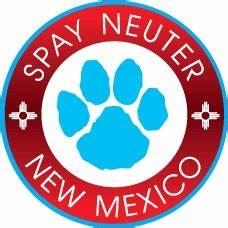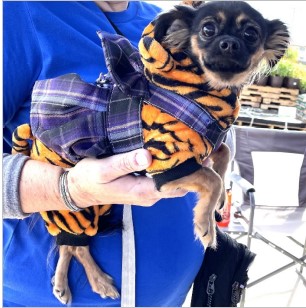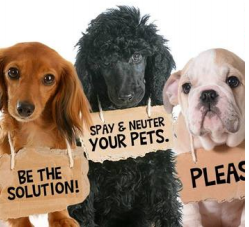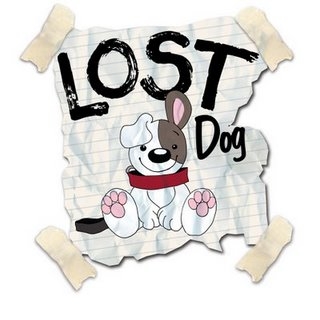“HERE’S A STEP BY STEP GUIDE TO HOW TO HELP. We need to get these Bills passed this year — they will help with low income spay/neuter bills throughout the State. INCLUDING Colfax County and Raton!! We’ll be stressing this the next several weeks. PLEASE — it is a way you can help us help the animals of the community. And EVERY community. Our Senator is Pete Campos; our Representative is Jack Chatfield.” Raton Humane Society
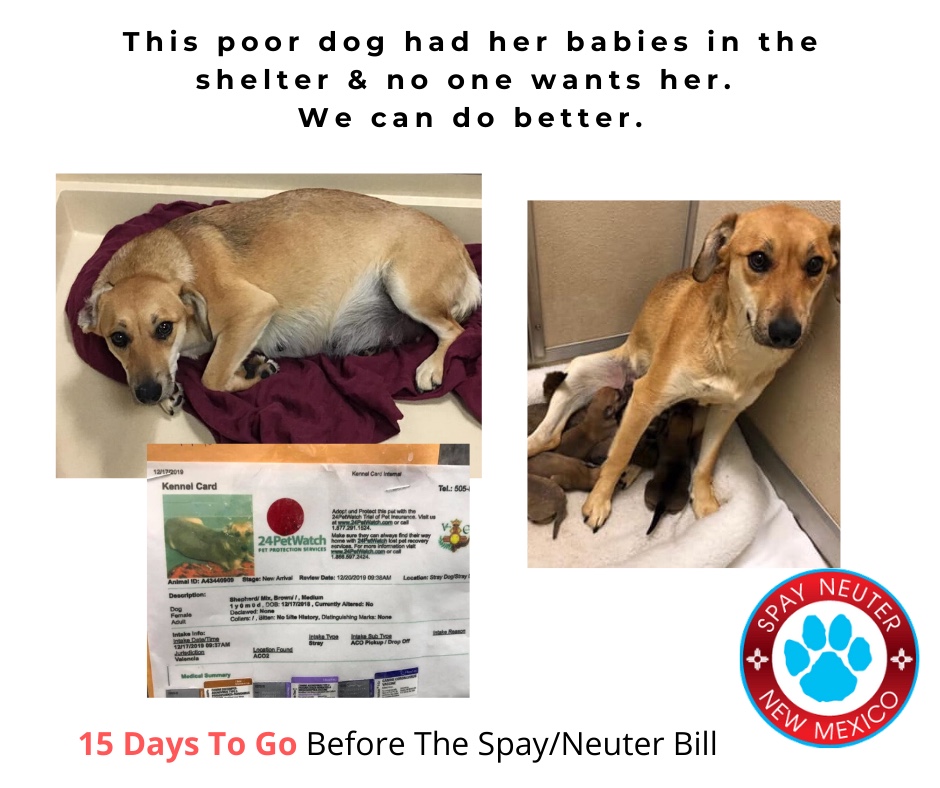
Spay-Neuter Coalition of NM
The babies and mom are STILL at the shelter today – almost one month later. If you can’t help them get to rescue please share this and help pass this bill for her!!
New Mexico’s 2020 legislative session is 15 days away.
Here are 3 things you can do now before the session starts on January 21, 2020:
1. Go to nmlegis.gov and click on the Legislators tab to locate your State Representative and State Senator. Contact both of your legislators and ask to set up a brief meeting with each of them. It can be in their office, in your home, a local café—whatever works!
2. When you meet with your legislators, share with them information about 2019’s Senate Bill 367 and House Bill 53 (Spay/Neuter Funding bills), and ask them to support similar legislation in 2020. For a fact sheet on the 2019 bill, visit apvnm.org/spayneuterbill2019. Please send APVNM a detailed debrief of your meeting with your legislators. How did they respond, what questions did they ask, did they agree to support the bill? More details are better.
3. Spread the word by signing and sharing the online petition: apnm.salsalabs.org/spayneuter. Encourage others to also contact both of their state legislators to ask for their support of this desperately-needed, life-saving measure. #spayneuternm #spayneuter #spayneuterbill #spayneuternewmexico
What Senate Bill 367 does:
• SB 367 will enact a modest fee paid by pet food manufacturers of $100/year for each product of dog and cat food and treats registered to be sold in New Mexico (added to the current $2 registration fee), phased in over a period of three years: $50 in 2020, $75 in 2021, and $100 in 2022 and beyond.
• It does NOT apply to:
o livestock feed or any other animal feed
o small businesses with annual gross revenue of $3 million or less
o prescription diets.
• Funding from the fee will pay costs of providing low-cost spay/neuter for animals of income-qualified New Mexicans in areas most in need (after 4% will go to NM Department of Agriculture to fund pet food registration enforcement, and up to 5% of remaining fee revenues may be used by NM Board of Veterinary Medicine for enforcement of the Animal Sheltering Act).
• The bill includes a 6-year sunset clause so the Legislature can assess the effectiveness of the fee increase.
• A similar bill passed the State Legislature in 2018 by a bipartisan 30-4 Senate vote and 48-19 House vote.
*Based on documented costs of animal control, care, and euthanasia in NM and intake/euthanasia reduction data from another state that recently raised pet food registration fees to fund spay/neuter, Animal Protection Voters estimates that local government animal control and shelters will see a recurring cost-savings of approximately $500,000/year.
For more information: Lisa Jennings (505-264-5082 / lisa@apvnm.org) or Jessica Johnson (505-220-6656 / jessica@apvnm.org)
Why do we need to fund spay/neuter? This effort responds to a history of requests from the State Legislature and state agencies to develop affordable and accessible spay/neuter resources in our state. A feasibility study on funding mechanisms requested by Senate Memorial 36 (2011) prepared for the Animal Sheltering Board, together with a comprehensive animal shelter survey conducted by Animal Protection of New Mexico, has found:
Ø New Mexico’s local governments and non-profits spend $38.5 million in tax and donor dollars to fund animal care, control and spay/neuter services—a number that has increased over time.
Ø Over 135,000 dogs and cats enter New Mexico’s animal shelters every year—about half are euthanized.
Ø Rural counties have the greatest need: Euthanasia rates are as high as 60%-85%.
Ø 2/3 of New Mexico counties have inadequate spay/neuter services.
What about other existing funding mechanisms? The NM Legislature has already created a spay-neuter license plate and a voluntary tax check-off program, but they have not generated nearly enough income for a comprehensive, statewide, subsidized spay/neuter program. The pet food manufacturer fee increase proposed by SB 367 is the best and only remaining feasible funding mechanism appropriate for New Mexico that is not already enacted. The following is an excerpt from the independent feasibility study that compared different funding mechanisms.
How are statewide spay/neuter funds administered in New Mexico? Funds will be administered by the NM Board of Veterinary Medicine, based on recommendations by its animal sheltering subcommittee.
How much funding would the additional fee provide for low-cost spay/neuter?
At the completion of the phase-in, the fee is expected to generate an estimated $1.26 million per year, with over $1.1 million annually dedicated to sterilize an estimated 16,000-22,000 dogs and cats of income-qualified New Mexicans.
This approach is PROVEN to be effective to reduce shelter pet euthanasia. Other states—West Virginia, Maine, and Maryland—have increased or added fees for spay/neuter onto existing pet food registration fees. Notably, Maryland passed legislation in 2013 raising pet food registration fees to $100 over the course of three years and reports a decrease in intake and dramatic 29% reduction in euthanasia.
Why this legislation makes sense:
Several other states charge pet food manufacturers up to $100 per product for sale in those states. New Mexico currently charges only $2/year per product. We are missing out. SB 367 would keep our pet food registration fees in line with what other states charge, but dedicate that money to low-cost spay/neuter services. If pet food manufacturers pass the fee to consumers by proportionally raising retail prices, it will average only $1.13 to $2.26 per year per pet-owning household (as it phases in). The best available data from states who have implemented similar pet food registration fee increases shows zero to negligible impact on consumer costs, retail pet food prices, and availability of product variety in those states. For example, since enacting a pet food manufacturer increase in Maine, the state reported a decrease in euthanasia, but also an increase in the number of pet food/treat products registered for sale.
This information is copied from: https://www.apvnm.org/wp-content/uploads/2019/02/FACTSHEET_SpayNeuter_SB367.pdf?fbclid=IwAR0R6aT4AhldfKFz80ke13nDcGNvk0h7PVugEJ7XxGh7w8IYVeS43i7_E2o

